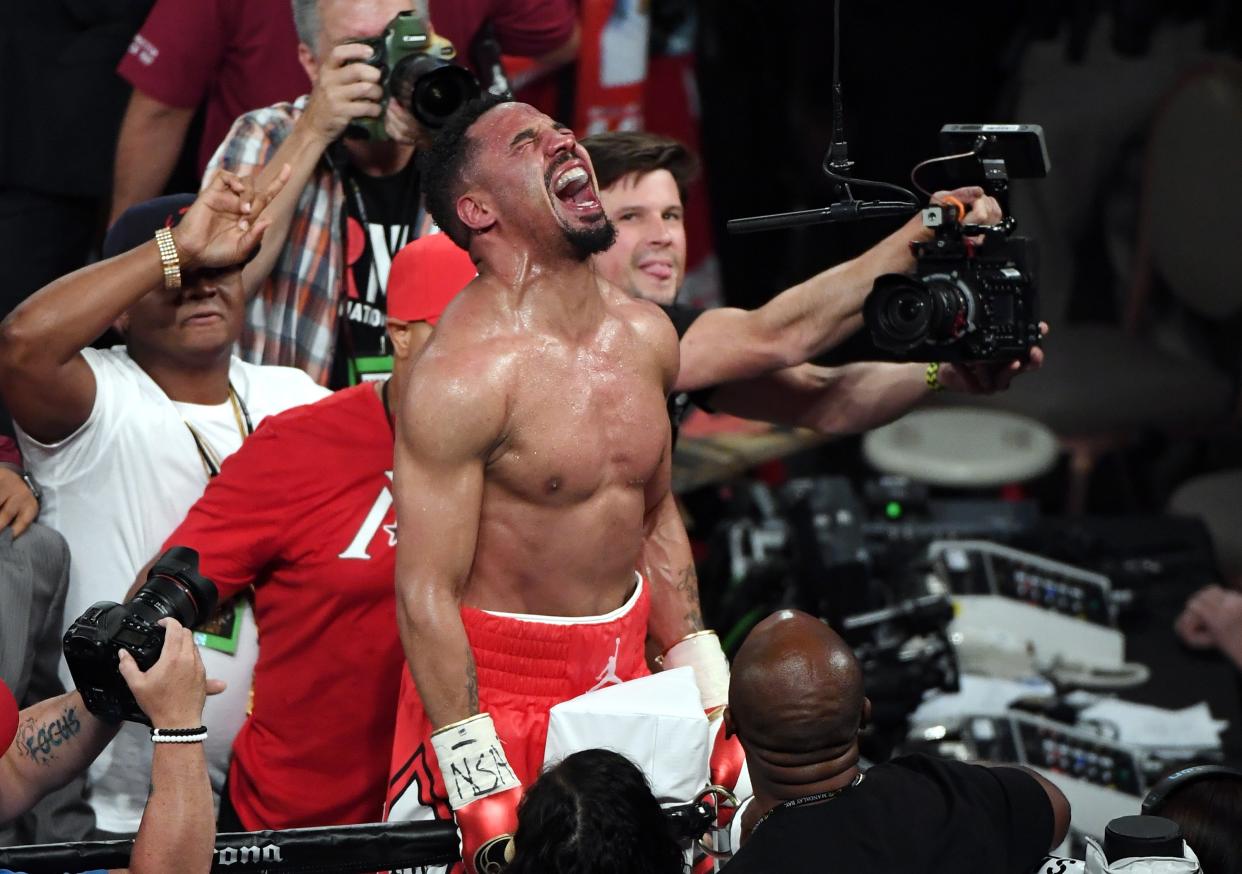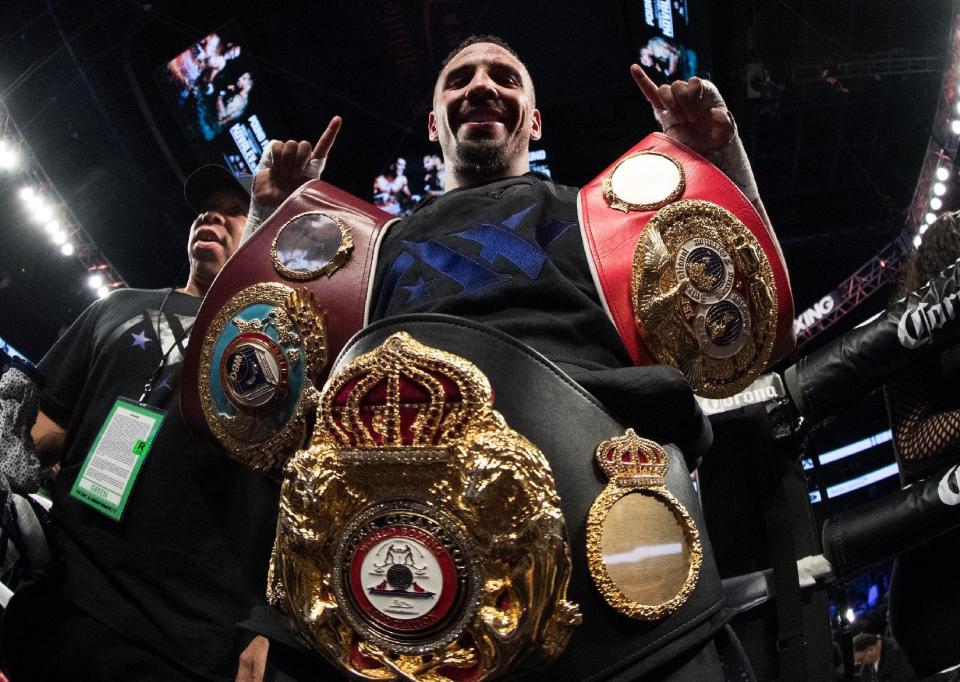The curious case of Andre Ward's complicated boxing legacy

Andre Ward’s sudden and shocking announcement that he is retiring from the sport of boxing at age 33 has left behind a complicated legacy that will surely be up for debate when it comes to his place among the all-time greats of the sweet science.
While no “retirement” is definitive, this is not something that came completely out of the blue for the 2004 Olympic gold medalist from Oakland, California. Over the past few years, Ward has often discussed leaving the game before it got the better of him. And for a man who has fought competitively since age 9, a quarter century of pugilism was more than enough.
If Ward’s departure from the game is a conclusive one, the debate regarding where he ranks among the greatest of all time will vary tremendously depending on whom you ask. For the hardcore fans, Ward’s legacy is one that saw him turn back the best of the best and seamlessly carry the torch as boxing’s pound-for-pound king in the wake of Floyd Mayweather’s retirement. However, casual fans will likely criticize Ward for not being a bigger star in the game despite an unbeaten record of 32-0 with 16 knockouts.
Both perspectives aren’t necessarily wrong.
Inside of the ring, Ward had no peer. He was a grandmaster on the pugilistic chess board who was as well-rounded as they came. More importantly, there was never a challenge that Ward wasn’t up for. He ducked nobody and faced just about everyone that you could think of despite politics playing a significant role in matchmaking. Simply put, Ward’s talent between the ropes couldn’t be denied.
His dominance in the Super Six World Boxing Classic — where he faced the very best super middleweights in the world from 2009 to 2011 and defeated them all quite handily — undoubtedly proved his championship pedigree as a boxer who transitioned from the amateur ranks without any difficulty whatsoever. As if winning the Super Six and unifying the super middleweight titles weren’t enough, Ward annihilated then fellow pound-for-pound fighter Chad Dawson with a 10th-round TKO that further cemented his place as the most complete fighter in the sport.
After injuries and a legal battle with his promoter took up much of his prime years, Ward challenged the man who was arguably the best pound-for-pound fighter in the sport when he faced the unbeaten and heavy-handed Sergey Kovalev. Although Ward was knocked down in the second round of the light heavyweight bout, Ward clawed his way back into the fight with his exceptional boxing ability and won a unanimous — albeit controversial — decision. Rather than shy away from the challenge of proving himself again against one of the most dangerous punchers in the sport, Ward accepted an immediate rematch. Not only did Ward win, but he stopped Kovalev in the eighth round, effectively doing what most critics said he couldn’t: score a knockout over the allegedly bigger puncher.
He also carries the distinction as the only unbeaten fighter who won all of his fights by knockout or unanimous decision. Aside from the controversial first bout with Kovalev, Andre Ward has never had a judge see the fight in the favor of his opponent. Not even Floyd Mayweather retired with that level of dominance over his opposition.
However, outside of the ring is where the criticism of Ward’s legacy carries the most weight. Although he is undoubtedly a first-ballot Hall of Famer, where Ward’s career has suffered has been with public perception.

As an Olympic gold medalist who has defeated all comers, one would think that Ward should have been a bigger draw than he was. Despite facing a fellow top five pound-for-pound opponent in Kovalev, both pay-per-view fights did relatively poorly in both buys and gate revenue. The initial meeting with Kovalev did roughly 160,000 PPV buys while the rematch only generated roughly 130,000 buys. If there was anything that Ward didn’t excel at, it was the art of self-promotion, which has become a necessarily evil in the wonderful world of boxing, a world that saw a self-promoting monster named Conor McGregor rake in nine figures despite never competing in a professional boxing match before facing Floyd Mayweather in August.
Some argue that Ward’s lack of mainstream viability had much to do with his race and refusal to pander himself off as a character. Where Mayweather excelled at creating a villainous persona that people coughed up loads of cash to see lose, Ward remained true to himself and his religion. Often considered polarizing because his outspoken views on religion and his nickname being “S.O.G.” (Son of God), Ward left little for the mainstream to sink its teeth into. There was little controversy that surrounded Ward and much of his talking was done with his fists inside of a boxing ring. Having the skills to pay the bills was Ward personified. Anything extracurricular that didn’t fall into his values carried little importance.
It can also be argued that Ward’s best years were lost due to injuries and a legal battle with former promoter Dan Goossen. After winning the Super Six and stopping Chad Dawson, Ward’s biggest fight was against inactivity. In 2013, Ward filed a suit to free himself from Goossen’s promotional contract. Between the legal battle and injuries, Ward faded from the public eye at a time when he was at the height of his professional career.
After Goossen’s untimely death in 2014, Ward managed to free himself and ink a deal with Jay Z’s Roc Nation. During this time, Ward’s reputation took a hit as he appeared to be primed for stardom. Some accused him of self-sabotage and, ultimately, it pushed him to the background as boxing was in the midst of a resurgence.
Ward’s refusal to compromise his integrity and beliefs may end up being what he is judged for when it comes to how he’s remembered. He may not end up as the greatest of all time, but he did it his way, never lost a fight, took on all challengers and will leave the sport with a healthy bank account and his health. And if all we can complain about is how he should have been a bigger star than he was, perhaps we’ve misunderstood Andre Ward the entire time.



